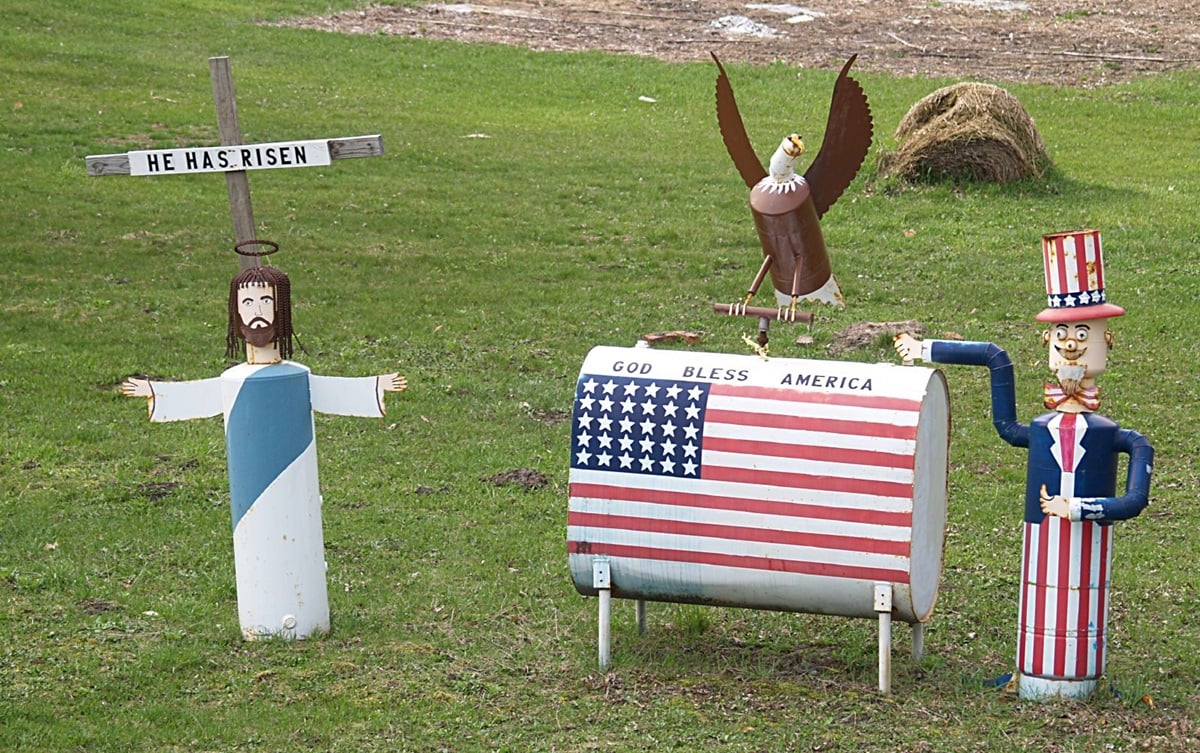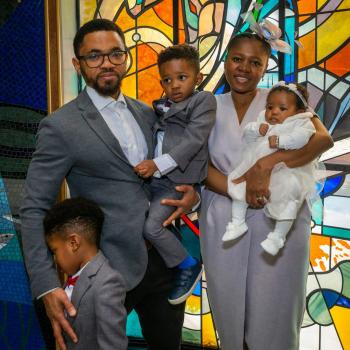Recently, I buried my father, a Christian patriot who understood the difference between loving God and country, and Christian Nationalism.

Born in 1945, Dad grew up in post-war America, with patriotism as the marrow in his bones. As a teenager, he joined the Boy Scouts, eventually earning the prestigious God and Country badge. Dad carried patriotic pride with him as he served his country in Vietnam. He embodied love of country even after he retired from twenty years in the US Army.
Dad Embodied Patriotism
Once he completed military service, my father enjoyed a second career training interrogators, doing surveillance, and working security for DARPA, where they make all the cool spy gadgets. Dad was a patriot and deserved the military honors he received at the National Memorial Cemetery at Quantico.
Growing up, our home boasted a twenty-foot flag pole in the front yard, where Dad flew the different iterations of the US flag that have been flown throughout the nation’s history. Dad embodied patriotism, surrounding himself with artistic representations of bald eagles, in recognition of our national bird. I now have a bald eagle tattooed on my right forearm, in his honor.
Patriotism and Faith vs. Christian Nationalism
That said, my God-and-Country father would have agreed with this statement: As good as patriotism and faith are, they are two separate things. A Christian can hold both sentiments at the same time. But when the two become indistinguishable, they take on a sinister quality that is more than the sum of their parts.
Supremacy, Violence, and Genocide
The faith-plus-patriotism hybrid, Christian Nationalism, has claimed many victims. Long before the establishment of sovereign nations in North America, Spanish conquistadors and Puritan pilgrims strove to Christianize “heathen Indians.” For the good of American commerce, Christian ministers taught enslaved persons that they must submit to their earthly masters. Religion plus power resulted in death for untold numbers.
In my articles, “The Chosen People and Guns: Our History of Supremacy, Violence, and Genocide” and “American Thanksgiving and God’s Chosen People,” I discuss the danger of calling ourselves a Christian nation. With biblical Israel’s genocide of the original Palestinians as an example, the US adopted the doctrine of Manifest Destiny, claiming the continent “from sea to shining sea.”
The “Christian” United States justified religious violence against Native Americans and enslaved Africans. In the name of conformity, it murdered or subjugated anyone it believed to be “other.” As the hybrid of spirituality and patriotism, Christian Nationalism, or what I have named “Americianity,” is a monster with two heads. Our founding fathers recognized this, and so they recommended a wall of separation between church and state.
The Idol of Americianity
In my article, The Idol of Americianity, I write:
From its beginning, the Church was anti-nationalist. Jesus’ message was so anti-imperial that he was executed on a Roman cross for treason. In the early generations, church leaders forbade Christians from becoming soldiers, because Roman troops were forced to take an oath of allegiance to Caesar, who was revered as a god. Believers were called to have one sole allegiance, and one proclamation, that Christ is Lord. For this reason, many were persecuted by Rome, and died as martyrs. For some reason, American Christians have decided it’s okay to have dual allegiance.
In the US, this dual allegiance of Christian Nationalism looks like American flags placed next to (or even in front of) the Communion table. It sounds like sermons quoting Presidents with more vigor than the words of Jesus. Americianity manifests as worship services for patriotic holidays where churches wave the flag so vehemently that you can no longer see the cross. Worse, Christian Nationalism turns every day into Election Day, insisting that the Evangelical vote equals support for a particular party or candidate. There’s got to be a better way for Christians to love their country, than to embrace the idol of Americianity.
A Northern Contrast
I discovered this better way when I moved to Canada. My patriotic dad would have been surprised to attend a worship service around Canada Day or Remembrance Day. Canadians certainly have national pride, but it’s quieter, more reserved. It’s rare to see flags in church sanctuaries up here. When there is a service focused on national identity, the tone is more humble than triumphant, more about attending to God’s leadership as a nation than declaring the country’s greatness.
Canadian Christianity is more decoupled from politics than in the States. That’s not to say that there aren’t Christian Nationalists in Canada. But, as evidenced by the recent election, Christian Nationalists aren’t having their way. That’s because, on the whole, Canadian Christians are more modest when speaking about national issues. Perhaps that is because Christianity is less culturally dominant here.
Marginalization is a Gift
I’ve heard American Evangelicals decry the marginalization of the Church in the UK and Canada. But perhaps this is a gift. It reminds us of the countercultural nature of following Jesus, whose kingdom is not of this world. When Christ calls us to take up our cross, he doesn’t ask us to carry it alongside a national banner. Instead, he invites us to be like yeast that humbly and subtly works through the dough to make the whole loaf rise. Being a Christian citizen is about helping your nation to rise as you influence it from within—not forcing your agenda on the country by making Christianity the dominant force.
A Church on the Margins
I’ll say it again—it’s a gift for the Church to be on the margins, and not the dominant cultural factor in society. In Rome, when the Church was marginalized, it felt more compassion for the poor, the enslaved, orphans, widows, foreigners, and others on the peripheries. But once the Church married Empire, it became more interested in getting its own way than helping people find their way. A Church on the margins is more inclined toward the needs of people on the margins. This, and not Christian Nationalism, is the spirit of Christ.
Church and State
Throughout much of his life, my father would have felt little difference between the American flag he wore on his uniform and the cross emblazoned on his Bible. But, while he loved both, he always knew which came first. And by the end, I think he recognized the contrast between the goals of the Church and those of the state.
Christian Nationalism is when a nation uses religion as a prop to push its political agenda, while religious people use political power as a hammer to enforce their morality. It’s a dangerous partnership that benefits the powerful and victimizes the disempowered. The faithful can only truly love their country when they hold their faith and patriotism separately. Only then can they do as Jesus commanded, and “give to Caesar what belongs to Caesar, and to God what belongs to God.”
For related reading, check out my other articles:
- We Don’t Need the National Day of Prayer
- Should I Attend See You at the Pole?
- “What’s Canadian Thanksgiving Aboot?” An American Explains














